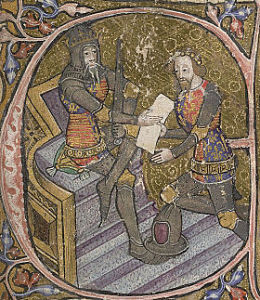265. Time of the Signs: the Fourteenth Century
An introduction to philosophy in the 14th century, focusing on two big ideas: nominalism and voluntarism.
Themes:
• S. Brown, T. Dewender and T. Kobusch (eds), Philosophical Debates at Paris in the Early Fourteenth Century (Leiden: 2009), 127-49.
• W.J. Courtenay, “Nominalism and Late Medieval Religion,” in C. Trinkhaus and H.A. Oberman (eds), The Pursuit of Holiness (Leiden: 1974), 26-59.
• W.J. Courtenay, Schools and Scholars in Fourteenth Century England (Princeton: 1987).
• R. Imbach, Le défi laïque: existe-t-il une philosophie de laïcs au Moyen Âge? (Paris: 2013).
• F. Oakley, Omnipotence and Promise: the Legacy of the Scholastic Distinction of Powers (Toronto: 2002).
• A. Zimmermann (ed.), Antiqui und Moderni: Traditionsbewusstsein und Fortgeschrittenbewusstsein im späten Mittelalter (Berlin: 1974).






Comments
golliards
Thanks, as always, Peter, for these wonderful podcasts which so enhance my own readings in philosophy. This latest one, introducing the 14th century, touched on the shift of learning away from Paris and Oxford toward other centers. It made me wonder if, among the many factors involved in this process, what role might have been played by Helen Waddell's "Wandering Scholars" of the previous century.
In reply to golliards by Jim Young
Itinerant scholars
Thanks for the interesting question! I am planning a whole episode on the spread of scholastic culture around Europe so I will try to read up on this and address it then (probably episode 296).
anticipations
Hi Peter,
some of this, though not the theological parts, will be formidably repeated in Thomes Hobbes's theoretical philosophy in the 17th century (whose relation to the scholastics will probably become a nice puzzle for you). He should really (and not only Descartes) be very thoroughly covered by you later on, as his enormous influence (e.g. on Hume) is not suffidiently recognized in all quarters. (See the British Hume scholar Paul Russell on this.)
Anyway, looking forward I wonder, where/when some of the favourite issues of the 17th century would already have shown up in the middle ages (if not before), e.g.
(a) qualities, primary vs. secondary (Galileo, Hobbes, Descartes, Locke + probably all of them)
(b) the ship of Theseus (Hobbes)
(c) persons + personal identity (Locke + surely Hobbes as well)
(d) essences, nominal vs. real
Maybe you`ll mention some other famous problems as well. But where did these 4 issues, in particular, already show up during the scholastic ages? Will you say anything somewhere in anticipation?
Ich freue mich auf die kommenden Episoden,
Michael
In reply to anticipations by Michael Gebauer
Anticipations
Danke für die Frage! First of all, most definitely Hobbes will get serious coverage - no doubt at least 4 episodes, maybe more.
The question of medieval anticipations is of course crucial and fascinating, and I guess I will be trying to draw those connections in future episodes very often. My sense is that actually the most striking anticipation in the 14th c is one you don't mention, namely skepticism: the breakdown of faith in the necessity of Aristotelian science is already well under way with voluntarists like Scotus and Ockham and also the idea of God's absolute power gives you scope for imagining counterfactual, skepticism-inducing situations sort of like Descartes' demon.
Of the four you mention, I may be wrong but I think (a) doesn't come up yet, really, because they are still happy with the essential/accidental contrast which is different; (b) and (c) are with us right through medieval because of debates about parts and wholes and individuation, which I've covered in several episodes; and (d) is touched on because of the question of whether we can grasp essences at all (in this life). You might remember Scotus was skeptical about this. But the big picture anyway is that early modernity seems to be starting a few centuries early, in some ways at least!
In reply to Anticipations by Peter Adamson
Thanks
Thanks a lot!
As for skepticism, I'm sure that you better aware than me that especially Nicole d'Autrecourt has been hailed as a great anticipator of Hume by Julius R. Weinberg, Margaret Wilson (in her Diss.) and by others. -- But as for (a), you know that you get Robert Pasnau constantly insisting in his book Metaphysical Themes that the distinction between primary and secondary qualities is of scholastic origin. -- But there is no worry that you will get to all of this,
I'm looking forward to it!
As always, thanks for you hints,
Michael
When it comes to the 14th
When it comes to the 14th century one shouldn't overlook Durandus of Saint-Pourcain. For one could argue that his rejection of the Aristotelian agent intellect was the seminal beginning of Modern Philosophy: once you accept this rejection, and are not a radical empiricist who rejects any kind of universal and necessary truths, there is no alternative to a turn to an apriori - be it in the manner of a Descartes, or a Malebranche, or, with an injection of the Humean critique of induction, of a Kant. Certanly Durandus's arguments against the Aristotelian agent intellect were taken over and copiously reproduced by such early-modern philosophers as Gassendi.
In reply to When it comes to the 14th by Michael Tavuzzi
Durandus
Yes, he's on my list though more as a figure to work in at some point than for a whole episode; still have to figure out how to cover him, like in a thematic episode. Thanks for the idea of bringing him in on this topic of the agent intellect.
Music
What is the musical piece playing during the intro?
In reply to Music by Charlie Comberrel
Music
NIce, isn't it? You can find links to all the music clips I've used under Links at the bottom of the page.
Zip file for 14th century?
I have been downloading your pod casts to listen to when I run. Is there a zip file of the pod casts for this section?
Thank you for doing this!
In reply to Zip file for 14th century? by Gaylyn Eddy
zip
Oh right, we should put that up - thanks for the reminder. In the meantime you can also download episodes individually off each episode page.
Hundred Years War
Just two corrections on the history:
- The Hundred Yeard War wasn't about Gascony, that's the short War of Saint-Sardos that happened a decade earlier, in which the king of France took most of the remaining possessions of the king of England in France, and forced him to pay hommage to him as vassal for the rest. The Hundred Years War was about the throne of France, which the Plantagenets who ruled England thought they had a better claim to than the Valois branch which ruled France after the demise of the direct line of the Capetians.
- King John's son (the future Charles V) wasn't captured with his father at the battle of Poitiers in 1356. Instead he was left to rule the civil war torn country as a teenager while his father was gone. During that time however, he did have to deal with an uprising of the merchants of Paris led by Etienne Marcel, who at one point stormed the royal palace and murdered two marshalls before the his eyes, effectively taking him hostage and eventually forcing him to flee the city.
In reply to Hundred Years War by Zarl
Medieval events
Thanks, I'll have to go back and double check what I said - I am pretty sure I would have gotten these things directly from a medieval history book, so perhaps they were being inexact. Anyway I am just revising the book version of the podcast so I can fix things still, for that (let me know if you spot anything else!).
In reply to Medieval events by Peter Adamson
Retracting the second correction
Well this is embarrassing. I looked it up to make sure and it turns out the second part was right: Philip (aptly named the Bold), the fourth and youngest son of John actually was captured along with his father. I just assumed it referred to the eldest son and heir Charles (aptly named the Wise), since he was also at the battle, but retreated in time. Damn your well-researched podcast that leaves almost nothing for me to nitpick. And sorry about that, if I do find anything else I'll make sure to actually double-check first!
Add new comment